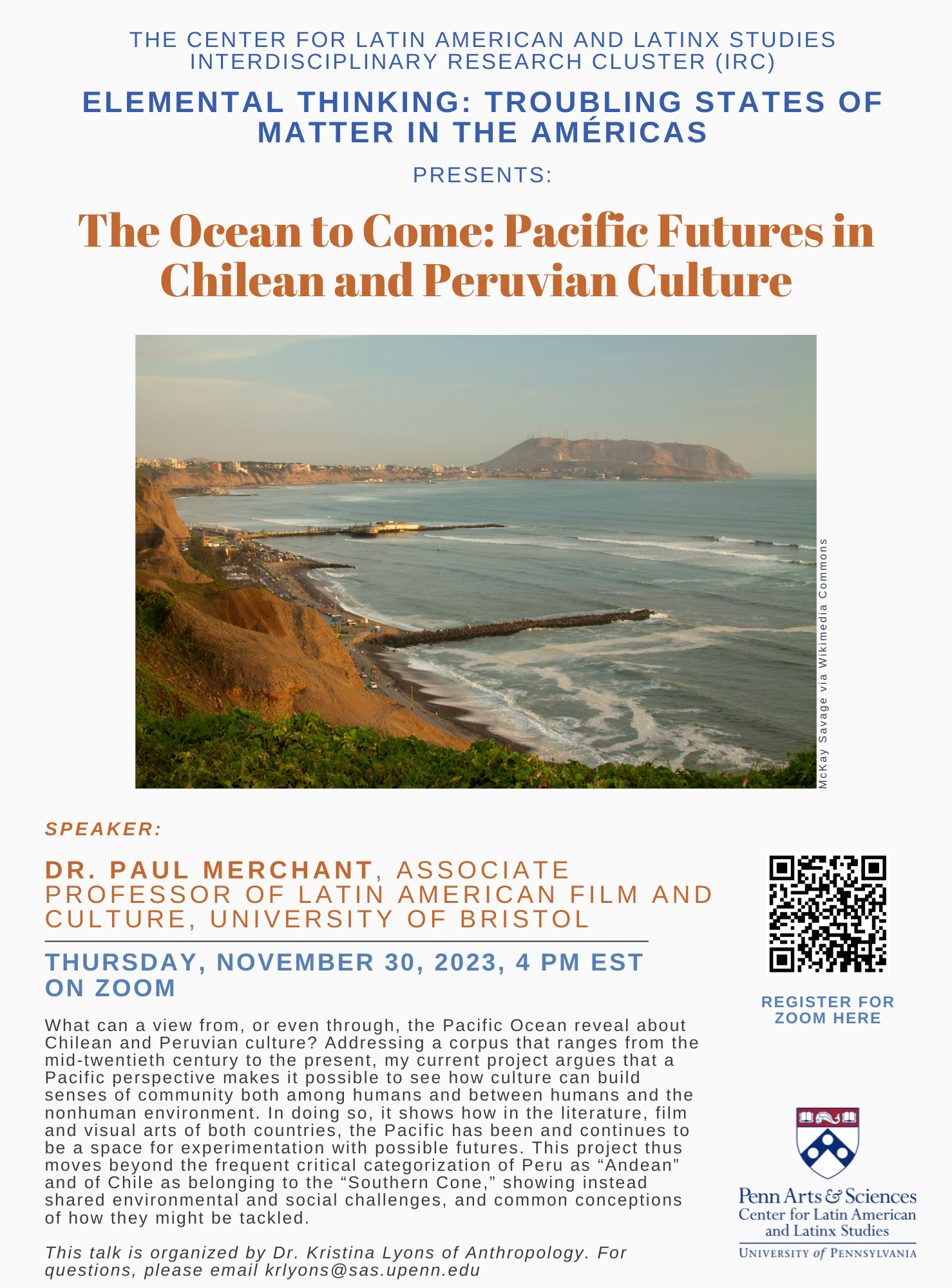
Paul Merchant, Associate Professor in Latin American Film and Visual Culture, University of Bristol will virtually present his current research in this third installment of the lecture series sponsored by the CLALS Interdisciplinary Research Cluster (IRÇ) "Elemental Thinking: Troubling States of Matter in the Americas." This IRC is led by Penn professors Kristina Lyons (Anthropology) and Jon Hawkings (Environmental Sciences) in collaboration with other professors and graduate students across Penn’s schools and partners from Latin America and the U.S.
Dr. Merchant will present:
The Ocean to Come: Pacific Futures in Chilean and Peruvian Culture
What can a view from, or even through, the Pacific Ocean reveal about Chilean and Peruvian culture? Addressing a corpus that ranges from the mid-twentieth century to the present, my current book project argues that a Pacific perspective makes it possible to see how culture can help build senses of community both among humans and between humans and the nonhuman environment. In doing so, it shows how in the literature, film and visual arts of both countries, the Pacific has been and continues to be a space for experimentation with possible futures. The project thus moves beyond the frequent critical categorization of Peru as “Andean” and of Chile as belonging to the “Southern Cone,” showing instead shared environmental and social challenges, and common conceptions of how they might be tackled. In this talk, I will provide an overview of the project, and sketch out the argument that the aesthetic characteristics of much contemporary artistic production in Chile and Peru, which I describe as constituting an “ecological avant-garde,” paradoxically engaged in simultaneous processes of rupture and immersion, respond to a tradition that can be traced through poetry and other art forms in both countries.
Bio:
Paul Merchant is Associate Professor in Latin American Film and Visual Culture at the University of Bristol, UK, where he also co-directs the Centre for Environmental Humanities. His current research project, supported by an AHRC Leadership Fellowship, explores cultural responses to the Pacific Ocean in Chile and Peru. He is the author of Remaking Home: Domestic Spaces in Argentine and Chilean Film, 2005-2015 (University of Pittsburgh Press, 2022), and the co-editor of Latin American Culture and the Limits of the Human (University of Florida Press, 2020) and ReFocus: The Films of Lucrecia Martel (Edinburgh University Press, 2022). He is also currently leading a team of researchers from the UK, Italy and the Netherlands on the project “Rethinking Values of the Anthropocene,” supported by a grant from the British Academy.
Here is an overview of the IRC:
The elements have been taken up as a heuristic in the Arts and Sciences to understand environmental systems and change across geographical and cultural contexts. The approach to studying environments through the elements – most notably the classical elements of fire, earth, water, and air – has been foundational to the composition of Environmental Anthropology and its configurations of expertise, as well as the Environmental Sciences. However, the stakes of our current socio-ecological crises demand we engage with the elements as more than only taxonomies, statistics, and natural resources. This proposed interdisciplinary research cluster focuses specifically on socio-environmental conflicts and justice struggles involving these elemental assemblages. Our IRC cluster will engage with these pressing issues by placing the social studies of science & technology (STS), environmental law/justice, and the natural and environmental sciences in conversation through the combination of several activities: talks with invited guests and the organization of workshops and roundtables. We will focus on both case studies and broad trends occurring across the hemisphere in academic scholarship, scientific knowledge production, and public praxis. (Written by Kristina Lyons)

 Center for Latin American and Latinx Studies
Center for Latin American and Latinx Studies